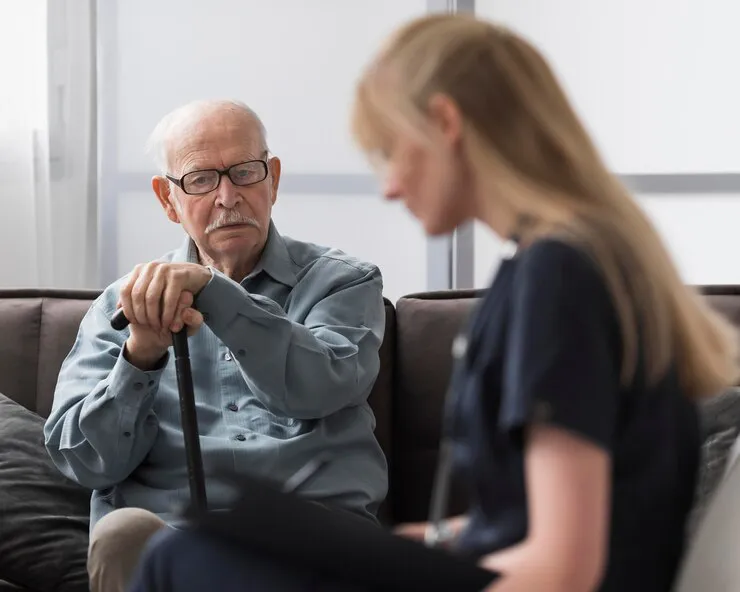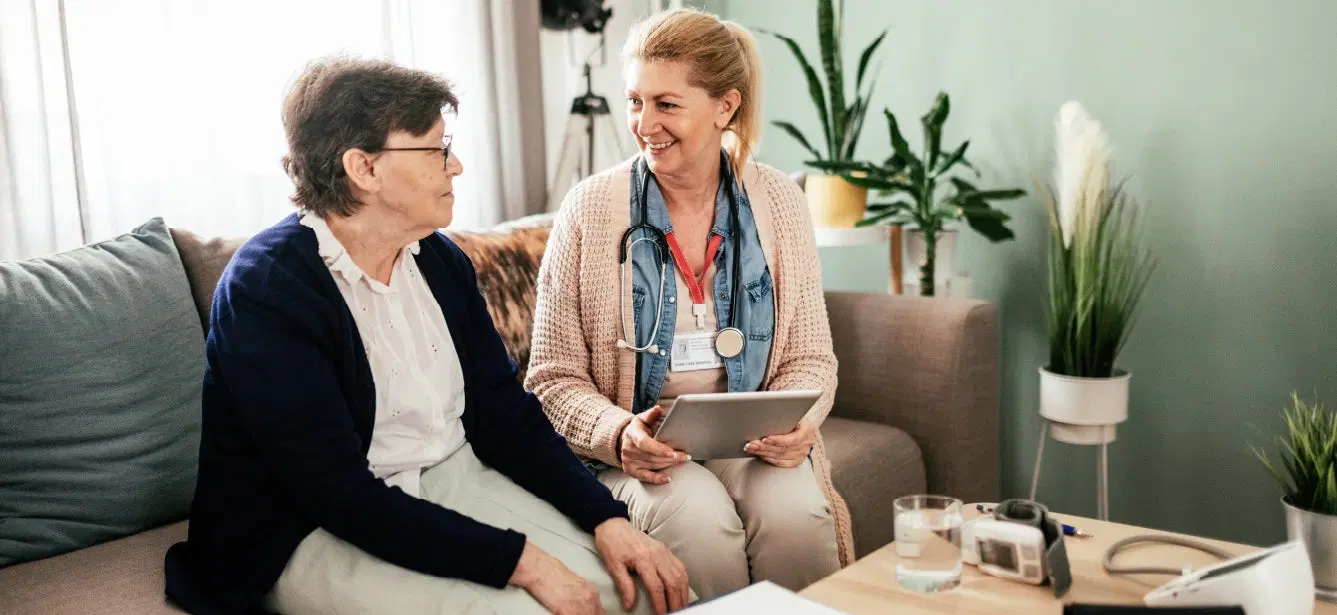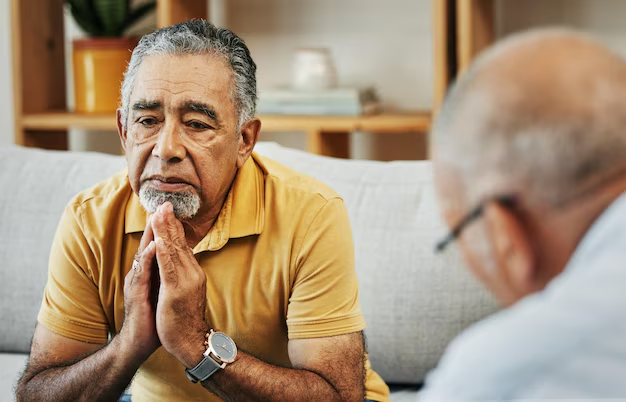
Top 7 Methods of Psychological Therapy for Older Adults
Aging, as a natural stage of life, comes with many physical and psychological changes. Psychological therapy for older adults is a professional process in which a therapist helps a client identify and solve their mental, emotional, and social problems. This process is based on trust and collaboration between the therapist and client and can include individual, group, or family sessions.
Older adults face numerous challenges in their lives, some of which may increase the need for psychological counseling. For example, loneliness and isolation, anxiety and depression, loss of independence, cognitive changes, financial problems, and changes in social roles are among the challenges many older adults face. But fortunately, by using various therapeutic methods such as individual counseling, cognitive-behavioral therapy (CBT), supportive psychotherapy, group therapy, reminiscence therapy, art therapy, and music therapy for seniors, older adults can be helped to continue living with more hope and motivation.
In this article from the Human Health Mag website, we will examine psychological therapy for older adults to take effective steps toward maintaining a good feeling in older adults. We will also provide more complete information about the signs and common challenges of old age that require psychological counseling.
The Importance of Mental Health in Older Adults
According to global statistics, the elderly population is growing rapidly. Projections show that from 2015 to 2050, the percentage of the world’s population over 60 will nearly double, increasing from 12% to 22%. This demographic shift highlights the importance of paying attention to mental health issues in elderly more than ever before.
It’s crucial not to underestimate the impact of psychological therapy for older adults. During this period, older adults face challenges such as loneliness, a decline in physical abilities, and changes in their social roles, all of which can have negative effects on their mental health. For this reason, staying mentally sharp as seniors requires special attention. Having a healthy mental life in old age not only helps improve the individual’s quality of life but also has a positive effect on their physical health, social relationships, and daily capabilities.

What Are the Psychological Challenges of the Elderly?
Old age is a sensitive and challenging period, and in addition to physical and motor illnesses, mental and psychological problems also emerge during this time. Psychological therapy for older adults can help them better cope with these changes and improve their quality of life.
For many families caring for an older adult, the question arises: What is the most important psychological problem in older adults? In fact, depression is one of the most common and critical psychological problems in older adults. Older adults may face depression for various reasons, such as the loss of loved ones, physical changes, or a feeling of worthlessness. Therefore, the timely identification and treatment or supporting elderly with depression play an important role in improving their mental state.
However, in addition to depression, there are other psychological problems that older adults may face. Most important psychological challenges associated with old age including:
Physical Changes
- Chronic illnesses: Chronic illnesses such as diabetes, heart disease, and other chronic problems can cause a lot of stress and worry, increasing the need for psychological support.
- Decline in physical abilities: These changes can also lead to feelings of isolation and loneliness, as older adults may have difficulty connecting with others. Mobility problems and a decline in physical abilities can also lead to feelings of helplessness and depression.
- Chronic pain: Sometimes chronic pains, such as joint pain, headaches, etc., require more extensive examination and psychological counseling.
Social Changes
- Retirement: Retirement can lead to feelings of purposelessness and reduced self-worth, as older adults may feel they no longer have a useful role in society.
- Loss of loved ones: The loss of a spouse, friends, and family members can cause feelings of loneliness and depression, and these negative feelings require psychological counseling.
- Social isolation of seniors and a sense of being ordinary: During retirement or after the experience of losing loved ones such as a spouse and friends, many older adults face a decrease in social relationships and feelings of loneliness. A decline in physical abilities and health problems can also lead to a decrease in social activities and feelings of isolation.
Psychological Changes
- Depression and mood disorders: Older adults may suffer from depression for various reasons, which usually requires psychiatric counseling for treatment.
- Anxiety and constant worries: Worrying about physical health, financial status, and the future can cause chronic anxiety. Over time, this anxiety can reduce the self-confidence of older adults and affect their sense of control over their lives.
- Dementia and Alzheimer’s: A decline in memory abilities and related disorders, such as dementia and Alzheimer’s, are among the problems that require special diagnosis and treatment. These disorders can cause confusion, forgetfulness, and behavioral changes that affect the quality of life.
![signs an older adult needs psychological therapy]()
what are signs that someone needs mental health treatment
Signs an Older Adult Needs Psychological Therapy
If you observe any of these signs in an older adult, psychological therapy can help improve their mental state and quality of life. Some of these signs include:
- Changes in appearance and dress: If the older adult suddenly has difficulty taking care of themselves and their appearance.
- Problems with concentration, decision-making, and confusion.
- Sudden decrease or increase in appetite and noticeable changes in weight.
- If the older adult feels sad or depressed for more than two weeks.
- Sleep problems, such as insomnia, sleepiness in the elderly or sleeping too much.
- If the older adult tends to be alone and avoids social activities, or makes any reference to suicidal thoughts or feelings of helplessness, they need immediate psychological therapy and counseling.
Benefits of Psychological Therapy for Older Adults
Many older adults feel that it’s too late and there’s no longer an opportunity for change; however, this view is mistaken. According to the findings of one study, psychotherapy in older adults is recognized as one of the most effective methods for reducing depression and promoting mental health therapy for seniors. If psychological therapy for older adults is performed correctly, many of the problems of old age will be solved. Some of these benefits include:
- Managing negative emotions
Helping older adults cope with the stress and anxiety resulting from life changes. Psychological therapy can help older adults better manage the stresses and anxieties that arise from life changes such as retirement, losing loved ones, and physical problems.
- Improving interpersonal relationships
Strengthening social skills and reducing feelings of loneliness. Psychological therapy can help older adults strengthen their personal and social skills and build better relationships with others. Counseling helps older adults reduce feelings of loneliness and isolation and gain more social support.
- Increasing older adults’ sense of satisfaction and happiness
With regular visits to a psychologist and solving problems, the quality of life of older adults will gradually increase, and they will have a greater sense of satisfaction with their lives.
- Learning coping skills for problems
Teaching new skills to manage life’s challenges. Psychological therapy helps older adults learn new coping skills and better deal with life’s challenges.
- Strengthening self-esteem
Increasing the self-confidence, sense of self-worth, and self-esteem in older adults is another thing that they can gain through psychological therapy.
Psychological Therapy Methods for Older Adults
What type of psychological therapy is suitable for older adults? When an older person is asked, “What do you live for?”, their answer can reveal the true meaning of their life. In fact, every person at every stage of life should seek a specific meaning that keeps their motivation and hope for life alive. In old age, this question becomes more apparent than ever, as the individual may face challenges such as a decline in physical abilities, loneliness, or a feeling of purposelessness.

In this regard, utilizing counseling and psychotherapy methods for older adults can be one of the most effective ways to return to life and increase its quality. The table below lists some of these methods that can be effective in this journey:
| Method of Psychotherapy | Treatable Problems | Benefits | Description |
| Supportive Counseling | Negative feelings, loneliness, loss of loved ones | Increased sense of self-worth and reduced feelings of uselessness, strengthened self-esteem | Creating a warm and supportive relationship between the therapist and the older adult, focusing on building a sense of self-worth. |
| Cognitive-Behavioral Therapy (CBT) | Depression, anxiety, worries resulting from old age | Helps manage anxiety and depression, changes negative thoughts | Identifying and changing negative thought patterns. |
| Individual Counseling | Communication problems, social changes | Improved communication skills and management of feelings of loneliness | Improved social and interpersonal relationships for older adults. |
| Group Therapy | Anxiety, depression, loss of loved ones | Reduced feelings of loneliness and anxiety and strengthened social relationships | Participating in support groups to share experiences. |
| Art Therapy | Improved hand-eye coordination, mood enhancement, strengthened morale | Improved physical and mental coordination, reduced anxiety, increased inner happiness, strengthened memory and concentration | Using art such as painting, drawing, and sculpting to improve the mental health of older adults. |
| Reminiscence Therapy | Strengthening memory and creating an emotional bond between generations | Strengthened family relationships, recalling positive memories, strengthened memory and sense of belonging | Recalling memories and looking at old photo albums and talking with family members for emotional bonding and memory strengthening. |
| Music Therapy | Stimulating cognitive function and emotional support | Improved short-term and long-term memory, facilitated movement and motivation, supported older adults’ emotions, strengthened morale | Using music as a therapeutic tool to strengthen memory and improve the emotional state of older adults, especially in cases of Alzheimer’s. |
How to Encourage Older Adults to Psychological Therapy
Encouraging older adults to seek psychological counseling requires a sensitive and empathetic approach. Older adults may refrain from asking for help due to feelings of stigma or fear of judgment. However, by creating a safe and non-judgmental environment, they can be reassured that their feelings and concerns are respected and accepted.
In this regard, the home is the safest place for older adults; a place where they can share their problems with a therapist without any worries and with peace of mind. Therefore, psychological counseling at home can be the best solution for older adults.
Advantages of In-Home Psychological Therapy for Older Adults
Having a therapist visit the home allows older adults to engage in conversation and therapy in a familiar and comfortable environment. The advantages of in-home counseling for older adults include:
- Convenience and comfort: Therapy at home without the need for transportation and traffic.
- Familiar environment: Greater sense of security and peace in the home setting.
- Flexibility: Scheduling counseling sessions to fit your daily routine.
- Privacy: Greater privacy and security, and more comfort in talking about personal issues.
- Full focus on therapy: No worries about commuting.
- Suitable for physical limitations: Easier access to counseling.

What are the Characteristics of a Good Psychotherapist for Older Adults?
Finding a good psychotherapist for older adults requires research and using the experiences of others. A good psychotherapist for older adults must have specific characteristics to best respond to their needs and problems. The psychotherapist must respect the life experiences and knowledge of older adults and use them as valuable resources.
Every older adult has their own specific needs and problems. The psychotherapist must be able to adapt to these needs and provide personalized solutions. A psychotherapist must understand individual differences and view each older adult as a unique person. This helps the psychotherapist better understand the older adult and make them feel comfortable.
Psychologists must be able to communicate effectively with older adults and be good listeners who provide appropriate responses. They must also be able to analyze problems and provide suitable solutions. These skills help the psychotherapist and psychologists assist older adults in solving their problems.
How to Choose the Right Psychotherapist for Older Adults
To choose a suitable psychotherapist, you can use the following methods:
- Ask for recommendations: Ask friends, family, the older adult’s caregiver, and people who have had psychotherapy experience. Recommendations from people who were satisfied with psychotherapy services can be very useful.
- Check the psychotherapist’s work and academic background: Make sure the psychotherapist has sufficient education and experience in counseling older adults. Checking the psychotherapist’s academic degrees and work history can help you make a better choice.
- Read reviews and feedback: Read reviews and feedback from others about the psychotherapist. These reviews can give you a better perspective on the quality of their services.
- Meet and talk with the psychotherapist: Before making a final decision, meet and talk with the psychotherapist. This meeting can help you see if the psychotherapist aligns with your needs and expectations.
- Pay attention to the psychotherapist’s specialization: Some psychotherapists specialize in specific areas such as family counseling, individual counseling, or group counseling. Make sure the psychotherapist you choose specializes in the area you need.
Concluding Remarks
Older adults live in a complex world that can change at any moment for various reasons. These changes can be physical, mental, and social. Not paying attention to these changes or not treating them in a timely manner may lead to more severe consequences and problems.
Therefore, counseling and psychotherapy methods for older adults, such as individual counseling, Cognitive-Behavioral Therapy (CBT), group therapy, and art therapy, can play an important role in improving the quality of life for older adults. In fact, these methods help older adults share their feelings and thoughts in a safe and non-judgmental space. Since every person has their own unique story, a psychotherapist, by understanding these stories, helps the older adult find solutions to improve their quality of life. In this journey, the support and companionship of family and caregivers can play a crucial role in creating a safe and supportive environment for older adults.
Psychological therapy for older adults helps them reduce stress, anxiety, depression, and other mental problems, better understand themselves and their feelings, improve relationships with others, and strengthen communication skills. In this article from the Human Health Mag website, we discussed the signs and common challenges of old age that require counseling, as well as the benefits of psychology and how to choose a good psychotherapist for these individuals.
If you also have experience with counseling techniques for older adults and psychology for your older adult, please share it with us and others.

Frequently Asked Questions
Here are answers to some common questions about psychological therapy for older adults:
Why do older adults need psychological therapy?
Because older adults face various challenges such as loneliness, the loss of loved ones, physical problems, and cognitive changes. Psychological counseling can help them better cope with these challenges and improve their quality of life.
How is psychotherapy with older adults performed?
Psychological counseling for older adults can be done individually, in a group, or with the family. Therapists use various methods such as talk therapy, Cognitive-Behavioral Therapy, and support groups to help older adults.
When should you consider psychological therapy for an older adult?
If your older adult shows signs such as depression, anxiety, chronic physical discomfort, sleep problems, decreased appetite, feelings of loneliness, or memory problems, they may need psychological counseling.
How much does psychological therapy for an older adult cost?
The cost of psychological therapy for older adults varies depending on the therapist, location, and type of service. Some therapists may offer discounts for older adults. It is best to check the costs before starting sessions and make sure you can afford them.
How can one find a psychologist specializing in older adult care?
You can use strategies such as reading reviews and feedback from others and checking a psychotherapist’s work history to find a psychologist who specializes in older adult care.

